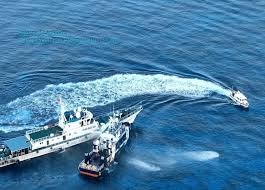I. South China Sea: Collision Heightens Sino-Philippine Tensions

The geopolitical temperature in the South China Sea has surged following a severe maritime incident, with the Philippines accusing a Chinese vessel of a deliberate and dangerous collision near Thitu Island (known to the Philippines as Pag-asa Island). Beijing has swiftly and categorically rejected the accusation, further escalating the high-stakes confrontation.
The incident, detailed in a formal statement by the Philippine Bureau of Fisheries and Aquatic Resources (BFAR), occurred at 9:15 AM local time on October 12. A Philippine vessel, the BRP Datu Pya, was initially targeted by a Chinese Coast Guard (CCG) vessel deploying a high-powered water cannon while operating near Thitu Island, which is a key feature in the disputed Spratly archipelago.
According to the BFAR communiqué, a scant three minutes after the water cannon assault, the same Chinese vessel executed an maneuver that resulted in an intentional ramming of the Philippine ship’s stern. While the BRP Datu Pya sustained minor damage, the BFAR confirmed that all personnel onboard escaped injury.
The Philippine Coast Guard (PCG) immediately characterized the action as “a brazen act of intimidation” and “unprovoked aggression.” They released visual evidence, including photographs and video footage, showing the CCG vessel aggressively shadowing and firing water cannons at the smaller Philippine craft. The PCG issued a defiant pledge: “Despite these provocations, we will neither yield nor abandon the maritime zones falling under our legal jurisdiction.”
Conversely, the China Coast Guard issued a counter-claim, asserting that the incident was precipitated by the Philippine vessel’s “illegal intrusion” into waters near Subi Reef (Meiji Reef in China), which they claim occurred despite repeated warnings. CCG spokesperson Liu Dejun stated that the Philippine ship’s “perilously close approach” necessitated the Chinese vessel’s “lawful interdiction measures,” shifting the “entire responsibility” for the collision onto the Philippines.
As reported by AFP, this collision is the latest in an alarming series of maritime skirmishes in the South China Sea, a critical artery through which over 60% of global maritime trade flows. Earlier incidents this year included:
A September confrontation near Scarborough Shoal where a Philippine sailor was injured after a Chinese water cannon shattered the bridge glass of the BRP Datu Gumbai Piang.
An August collision between two Chinese vessels—a Chinese Navy ship and a CCG vessel—while they were pursuing a Philippine patrol boat in the contested region.
These events reinforce the view among analysts that the conflict is intensifying, often disregarding the 2016 international arbitral tribunal ruling that invalidated China’s extensive “nine-dash line” claims. In response, the Philippines is aggressively fortifying its defense ties, particularly with the United States, demonstrated by joint military exercises and the unprecedented August joint patrol in the South China Sea with Indian Navy warships, including the guided-missile destroyer INS Delhi.
II. Diplomatic Storm: South Korea Addresses Surge in Kidnappings in Cambodia
A significant diplomatic rift has opened between Seoul and Phnom Penh, following a dramatic increase in the kidnapping of South Korean citizens linked to lucrative job scam operations in Cambodia. South Korean Foreign Minister Chung Eui-yong took the rare step of summoning the Cambodian Ambassador to express his government’s severe discontent.
Data presented by South Korean lawmaker Na Kyung-won’s office paints a disturbing trend: the annual average of 10 to 20 reported kidnappings of South Koreans in Cambodia skyrocketed to 220 in 2024 and reached 330 by August 2025.
The recent death of a South Korean university student, allegedly abducted and tortured by a Cambodian criminal syndicate, has profoundly shocked the South Korean public. Victims are reportedly lured by deceptive high-salary employment offers, only to be held captive and forced into labor at sophisticated fraud centers.
The Korea Times noted that during the diplomatic meeting, Minister Chung conveyed a “strong protest” and urged the Phnom Penh administration to implement more “resolute and decisive measures” to dismantle the kidnapping and scam networks targeting its citizens.
The Cambodian Ambassador acknowledged the gravity of Seoul’s concerns and committed to relaying the full details back to his government. Meanwhile, the South Korean government is closely coordinating with Cambodian officials to finalize a joint appointment for the deceased student’s autopsy, scheduled for later this month. This tragic case has fueled intense public anger, especially given reports that the victim’s family received a ransom call for 50 million KRW (approx. $35,200 USD) and that the victim’s body remained unrepatriated two months after his discovery.
III. Pakistan-Afghanistan Border Erupts in Cross-Frontier Clashes
The mountainous border region separating Pakistan and Afghanistan has become the site of renewed, heavy military exchanges. Afghan Taliban forces reportedly launched retaliatory attacks on Pakistani border posts following earlier Pakistani airstrikes near Kabul.
Pakistani security officials confirmed they were engaging with “full retaliatory force” against what they termed “unprovoked shelling” from Afghan territory. Fighting began late on October 11 across at least six border areas.
While the Taliban claimed the capture of three Pakistani border outposts, Pakistani security sources countered that their military had successfully destroyed multiple Afghan border fortifications. Videos shared by Pakistani officials visually depicted the intense exchange of artillery and gunfire illuminating the night sky.
Enayatullah Khwarizmi, spokesperson for the Afghan Ministry of Defense, explicitly labeled the operation a “retaliation” for Pakistan’s recent violation of Afghan airspace, which included the alleged bombing of a market in the Magah region on October 9. Khwarizmi concluded with a stern warning, stating that the Afghan Armed Forces are “prepared to defend our airspace and will respond powerfully” to any future encroachment.
These border clashes unfolded concurrently with the Afghan Foreign Minister’s visit to India to discuss bolstering bilateral ties. A joint statement from the ministers, which included India’s appreciation for Afghanistan’s strong condemnation of the deadly April attack in Poonch—an event that had previously sparked a four-day conflict between Pakistan and India—was immediately met with official displeasure from Islamabad.

IV. Thailand Launches Probe into Israeli Business Operations on Koh Phangan
Thai authorities have initiated a comprehensive investigation into allegations that Israeli nationals are operating illegal businesses on the popular tourist destination of Koh Phangan. The probe was triggered by mounting concerns from local residents regarding the perceived “excessive and disrespectful” presence of some foreign visitors.
Locals have controversially nicknamed the island “Tel Aviv the Second,” expressing concerns that Israeli visitors are utilizing extended visa stays to establish businesses through illicit nominee arrangements (using Thai citizens as fronts), often demonstrating a lack of respect for indigenous culture and other tourists.
The investigation was propelled by the re-emergence of a five-month-old viral video in which a female Israeli tourist was recorded allegedly stating, “My money built your country,” after being asked to adhere to a no-shoes policy in a local store. This video has intensified public sentiment, spreading across social media channels, including a popular local page dedicated to “saving” the island, drawing parallels to the previous situation in Pai town, Mae Hong Son province, which also saw an overwhelming influx of Israeli businesses and residents.
To address the issue, Royal Thai Police Chief General Kittirath Phanphet has ordered a coordinated effort, establishing a joint task force to investigate the land ownership and business licensing of foreign-run entities suspected of violating or circumventing Thai law.
Preliminary data released by the Royal Thai Police indicated multiple arrests of Israeli citizens in the Koh Phangan and Koh Samui areas for offenses including running illegal car rental services, working outside authorized visa parameters, operating without proper business licenses, and acting as unlicensed tour guides.
While Governor Terus Supavi Bopit of Surat Thani province noted that no official complaints had been lodged, initial checks confirm that “some concerns are substantiated.” Consequently, Thai immigration officials are slated to conduct a meticulous review of all visitors repeatedly extending their visas, targeting those suspected of illegal employment or business activities.
In a related labor policy move, Thailand announced a 15-day registration period for an estimated 500,000 to 700,000 undocumented workers from Cambodia, Laos, Myanmar, and Vietnam. This new initiative, approved by the Thai Cabinet, aims to alleviate labor shortages by allowing these individuals to legally reside and work in Thailand for a maximum of one year, formally integrating them into the national employment system.





